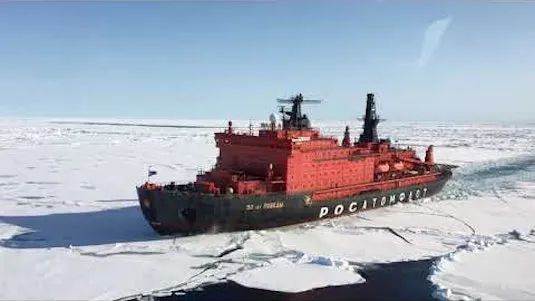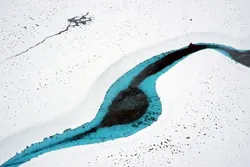
Arctic Security Fundamentals 
The Arctic is a region of extreme conditions, with frigid waters, tundra, and long periods of light and darkness. Despite its harsh environment, the Circumpolar North is home to a wealth of resources and opportunities for nations and Indigenous peoples. This course, Arctic Security Fundamentals, provides an overview of the region and its security implications. It covers topics such as the Arctic Council, climate change, and the legal framework for Arctic security. ▼
ADVERTISEMENT
Course Feature
![]() Cost:
Cost:
Free
![]() Provider:
Provider:
Edx
![]() Certificate:
Certificate:
Paid Certification
![]() Language:
Language:
English
![]() Start Date:
Start Date:
Self paced
Course Overview
❗The content presented here is sourced directly from Edx platform. For comprehensive course details, including enrollment information, simply click on the 'Go to class' link on our website.
Updated in [March 06th, 2023]
By taking this course, you can gain a comprehensive understanding of the Arctic security environment, including the key stakeholders responsible for diplomacy and defense. You will learn about the international norms and processes governing security in the Circumpolar North, as well as the balance of diplomacy and defense that nations employ to manage priority interests. You will also explore how the three realms of international relations—cooperation, competition, and conflict—interact in this unique environment. Additionally, you will gain insight into the challenges and opportunities that exist in the Arctic, such as shipping management, oil and gas production, mining activities, fisheries management, protection of threatened species, and significant defense-related difficulties.
[Applications]
Upon completion of the Arctic Security Fundamentals course, participants will have a better understanding of the security situation in the Circumpolar North, the key stakeholders involved, and the international norms and processes governing security in the region. They will be able to apply this knowledge to their own professional and academic pursuits, as well as to the development of strategies for managing security in the Arctic.
[Career Paths]
Recommended career paths from this course include:
1. Arctic Security Analyst: Arctic Security Analysts are responsible for researching and analyzing security issues in the Arctic region. They must be knowledgeable about the international norms and processes governing security in the Circumpolar North, as well as the balance of diplomacy and defense that nations employ to manage priority interests. This job is expected to grow in demand as the Arctic region continues to experience rapid changes in climate and technology.
2. Arctic Security Consultant: Arctic Security Consultants provide advice and guidance to organizations and governments on security issues in the Arctic region. They must be knowledgeable about the international norms and processes governing security in the Circumpolar North, as well as the balance of diplomacy and defense that nations employ to manage priority interests. This job is expected to grow in demand as the Arctic region continues to experience rapid changes in climate and technology.
3. Arctic Security Officer: Arctic Security Officers are responsible for ensuring the safety and security of personnel and resources in the Arctic region. They must be knowledgeable about the international norms and processes governing security in the Circumpolar North, as well as the balance of diplomacy and defense that nations employ to manage priority interests. This job is expected to grow in demand as the Arctic region continues to experience rapid changes in climate and technology.
4. Arctic Security Researcher: Arctic Security Researchers are responsible for researching and analyzing security issues in the Arctic region. They must be knowledgeable about the international norms and processes governing security in the Circumpolar North, as well as the balance of diplomacy and defense that nations employ to manage priority interests. This job is expected to grow in demand as the Arctic region continues to experience rapid changes in climate and technology.
[Education Paths]
Recommended degree paths:
1. Bachelor of Science in Arctic Security: This degree program provides students with a comprehensive understanding of the security challenges and opportunities in the Arctic region. Students will learn about the international norms and processes governing security in the Circumpolar North, as well as the balance of diplomacy and defense that nations employ to manage priority interests. This degree program is ideal for those interested in pursuing a career in security-related fields, such as defense, intelligence, and law enforcement.
2. Master of Science in Arctic Studies: This degree program provides students with an in-depth understanding of the Arctic region, its people, and its resources. Students will explore the history, culture, and environment of the Arctic, as well as the challenges and opportunities that come with living and working in the region. This degree program is ideal for those interested in pursuing a career in research, policy, or management related to the Arctic.
3. Doctor of Philosophy in Arctic Security: This degree program provides students with an advanced understanding of the security challenges and opportunities in the Arctic region. Students will explore the international norms and processes governing security in the Circumpolar North, as well as the balance of diplomacy and defense that nations employ to manage priority interests. This degree program is ideal for those interested in pursuing a career in research, policy, or management related to Arctic security.
Developing trends:
1. Increased focus on climate change: As the Arctic region continues to warm, the security implications of climate change are becoming increasingly important. This has led to an increased focus on understanding the impacts of climate change on the Arctic region and developing strategies to mitigate and adapt to these changes.
2. Increased focus on Indigenous rights: As the Arctic region continues to develop, the rights of Indigenous peoples are becoming increasingly important. This has led to an increased focus on understanding the rights of Indigenous peoples in the Arctic region and developing strategies to ensure their rights are respected.
3. Increased focus on international cooperation: As the Arctic region continues to develop, the need for international cooperation is becoming increasingly important. This has led to an increased focus on understanding the need for international cooperation in the Arctic region and developing strategies to ensure cooperation between nations.
Course Provider

Provider Edx's Stats at AZClass
Discussion and Reviews
0.0 (Based on 0 reviews)
Explore Similar Online Courses

Taking on the Climate Crisis with Social Change

Master Photography Composition

Python for Informatics: Exploring Information

Social Network Analysis

Introduction to Systematic Review and Meta-Analysis

The Analytics Edge

DCO042 - Python For Informatics

Causal Diagrams: Draw Your Assumptions Before Your Conclusions

Whole genome sequencing of bacterial genomes - tools and applications

The Ideal of Self-Governance: Public Policy Beyond Markets and States

Public Administration

Compelling Narratives for Complex Decisions: Policy Analyst Fundamentals
 Related Categories
Related Categories
 Popular Providers
Popular Providers
Quiz
 Submitted Sucessfully
Submitted Sucessfully
1. What is the main focus of the course Arctic Security Fundamentals?
2. What type of professionals would benefit from taking this course?
3. What are the three realms of international relations discussed in this course?
4. What are the three realms of international relations in the Arctic?
Correct Answer: Cooperation, competition, and conflict


Start your review of Arctic Security Fundamentals